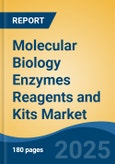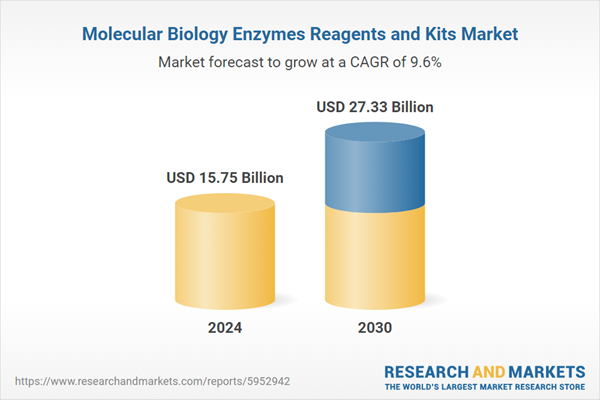Kits and Reagents is the fastest growing segment, North America is the largest regional market
Speak directly to the analyst to clarify any post sales queries you may have.
10% Free customizationThis report comes with 10% free customization, enabling you to add data that meets your specific business needs.
Key Market Drivers
Increased Research and Development (R&D) investments in life sciences represent a fundamental driver for the Global Molecular Biology Enzymes Reagents and Kits Market. Substantial financial commitments by pharmaceutical and biotechnology companies fuel the discovery of new disease mechanisms and the development of advanced therapeutic and diagnostic solutions, directly necessitating sophisticated molecular tools. This sustained funding supports various research phases, from basic scientific inquiry to preclinical and clinical trials.Key Market Challenges
The high cost associated with advanced molecular biology technologies and the specialized expertise required for their effective utilization represents a significant impediment to the growth of the Global Molecular Biology Enzymes Reagents and Kits Market. This financial burden restricts broader adoption of critical research and diagnostic tools, particularly within emerging markets and institutions operating with limited budgets. Consequently, potential users, including academic laboratories and smaller biotechnology firms, may defer or forgo investments in cutting-edge molecular biology workflows that rely heavily on these specialized enzymes, reagents, and kits.Key Market Trends
The shift towards precision medicine and personalized diagnostics significantly influences the molecular biology enzymes, reagents, and kits market by necessitating advanced molecular profiling. This trend, focusing on tailoring treatments to individual patient profiles, is notably driven by the increasing global cancer burden. According to the International Agency for Research on Cancer (IARC), 20 million new cancer cases were reported globally in 2022, highlighting the critical need for individualized diagnostic and therapeutic approaches. Such emphasis on specific genetic markers increases the utilization of specialized sequencing reagents and biomarker detection enzymes.Key Market Players Profiled:
- Thermo Fisher Scientific, Inc.
- Illumina, Inc.
- Agilent Technologies, Inc.
- QIAGEN N.V.
- Promega Corporation
- Merck KGaA
- F. Hoffmann-La Roche Ltd.
- Bio-Rad Laboratories, Inc.
- Takara Bio Inc
- Bausch Health Companies Inc.
Report Scope:
In this report, the Global Molecular Biology Enzymes Reagents and Kits Market has been segmented into the following categories:By Product Type:
- Kits and Reagents
- Enzymes
- Polymerase
- Ligases
- Restriction Endonucleases
- Reverse Transcriptase
- Others
By Application:
- Polymerase Chain Reaction
- Sequencing
- Epigenetics
- Other
By End-User:
- Academic and Research Institutes
- Pharmaceutical and Biotechnology Companies
- Hospitals and Diagnostic Centers
- Others
By Region:
- North America
- Asia-Pacific
- Europe
- South America
- Middle East & Africa
Competitive Landscape
Company Profiles: Detailed analysis of the major companies present in the Global Molecular Biology Enzymes Reagents and Kits Market .Available Customizations:
With the given market data, the publisher offers customizations according to a company's specific needs. The following customization options are available for the report.Company Information
- Detailed analysis and profiling of additional market players (up to five).
This product will be delivered within 1-3 business days.
Table of Contents
Companies Mentioned
The companies profiled in this Molecular Biology Enzymes Reagents and Kits market report include:- Thermo Fisher Scientific, Inc.
- Illumina, Inc.
- Agilent Technologies, Inc.
- QIAGEN N.V.
- Promega Corporation
- Merck KGaA
- F. Hoffmann-La Roche Ltd.
- Bio-Rad Laboratories, Inc.
- Takara Bio Inc
- Bausch Health Companies Inc.
Table Information
| Report Attribute | Details |
|---|---|
| No. of Pages | 180 |
| Published | November 2025 |
| Forecast Period | 2024 - 2030 |
| Estimated Market Value ( USD | $ 15.75 Billion |
| Forecasted Market Value ( USD | $ 27.33 Billion |
| Compound Annual Growth Rate | 9.6% |
| Regions Covered | Global |
| No. of Companies Mentioned | 11 |









